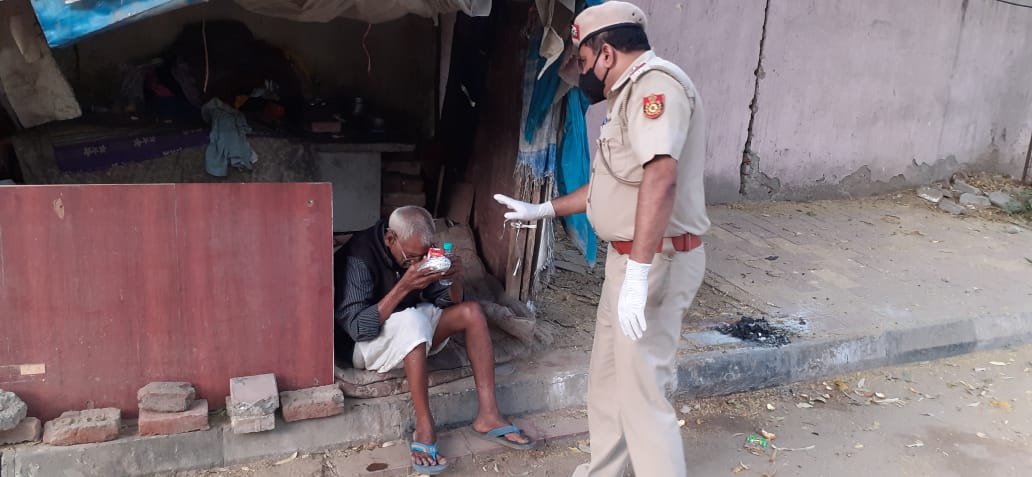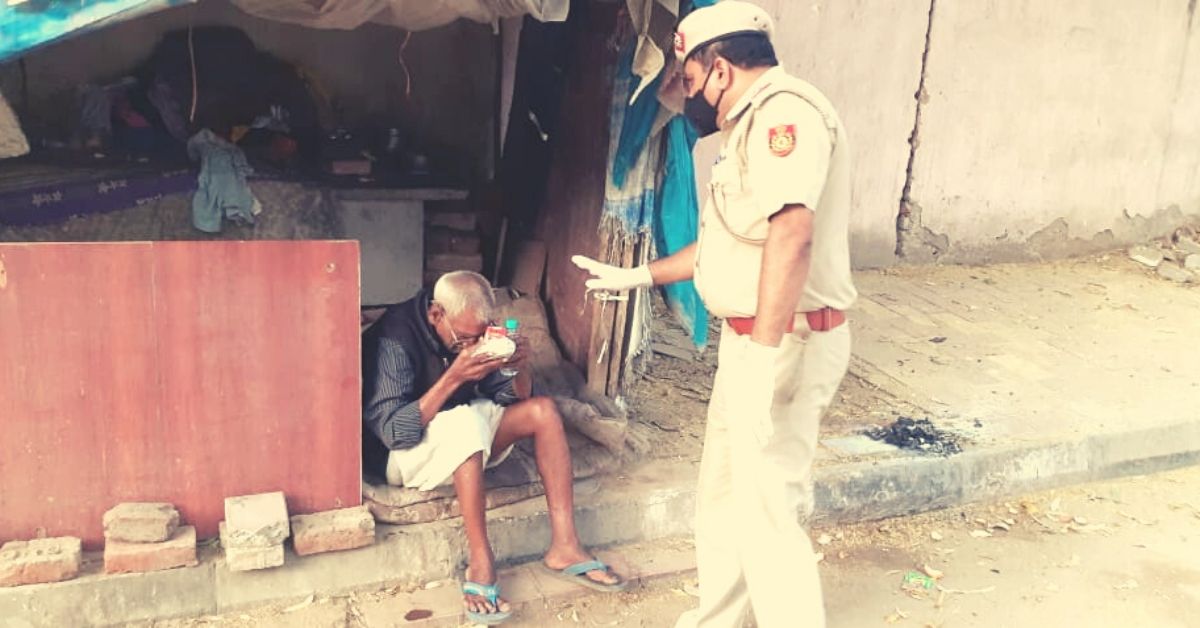In the past fortnight, multiple visuals of police personnel beating and humiliating civilians violating the nationwide COVID-19 lockdown have been circulating in social media, resulting in severe criticism from several quarters.
But there is one police officer in New Delhi, the national capital, who is doing a stellar job of looking out for some of our most vulnerable citizens.
Through his beat constables, Station House Officer (SHO) Arvind Kumar (48), who is in charge of a police station in Defence Colony, an upmarket residential area in South Delhi, got the news that hundreds of families residing in Indira Camp, a slum area behind the police station, didn’t have enough rations to survive the lockdown. Most of them were daily wage workers, safai karamcharis or labourers in the informal sector.

“After finding out that around 350 families didn’t have enough rations for more than three days, we consulted them. Following this, everyone at the police station pooled in their money and bought food bags. This happened immediately after the lockdown was announced. At our station, we knew a few safai karamcharis and manual labourers who did odd jobs for us but were living hand to mouth. While I was getting those bags distributed, they found out that rations were being collected for the underprivileged at the station. Soon, the news spread and more people began to arrive,” says SHO Arvind Kumar, in a conversation with The Better India.
Each food bag contains 2 kg of wheat, 2 kg rice, 2 kg dal of different varieties and 1 litre cooking oil. These rations can last for a couple of days, and more is needed. While SHO Kumar initially arranged for 50 food bags, thus far, they have distributed over 200 of them.
“We currently have a stock of about 200-250 food bags and are helping around 300-350 families, who live hand to mouth. We also distribute goodies like Maggi and snacks to the children. Even the government has stepped in to deliver food and rations. Besides, we have also distributed hand sanitisers, masks and gloves. We have a couple of volunteers helping us organise those gathered there,” he says.
Making matters better, many affluent families living in Defence Colony came forward to donate food since many of their domestic helpers live in Indira Camp. “After some women residents decided to chip in with packets of cooked food like rotis, vegetables or sometimes even sandwiches in silver foil, a WhatsApp group of willing volunteers was created with 25-30 residents. We have also started tea and snacks services for those engaged in essential services during the lockdown,” says SHO Kumar.
The food items are collected and sent away in police vehicles to a designated spot, where they are distributed twice a day at 11:30 AM and 5 pm for one hour each every day.
Residents can donate any amount and any food, while distribution is left to the police and a few volunteers. The objective, according to SHO Kumar, is to ensure Indira Camp residents stay indoors and take all necessary precautions during the epidemic.
“We have assured them that they will not go hungry, while also urging them to remain safe, stay indoors and take all precautions. Government agencies are active, but if they face any problems with regards to medicines or essentials, we have asked them to call our duty officers. There was initially a great deal of apprehension within the community, but since we started this initiative, most migrant workers have stayed instead of leaving,” he claims.
If they really have to leave, the police coordinate with other authorities and establish a proper system of transport instead of compelling them to walk endlessly.
But there are daily wagers who have dependents back in their home village across different states, who rely on the money sent to them every month. With no work or money forthcoming during a lockdown, what SHO Kumar’s team has done is taken down their home numbers, reached out to our counterparts in their villages or the resident MLA or MP with whom they speak with and arrange their essentials.
“Moreover, the respective state governments have started their own schemes to take care of their families. Thus far, residents have been very cooperative. But we need volunteers to step up distribution of sanitisers, face masks, and gloves, instead of more food that sometimes gets wasted,” he concludes.
Also Read: COVID-19: 8 Municipal Corporations Delivering Veggies, Groceries To Doorsteps
(Edited by Gayatri Mishra)
Like this story? Or have something to share? Write to us: contact@thebetterindia.com, or connect with us on Facebook and Twitter.
If you found our stories insightful, informative, or even just enjoyable, we invite you to consider making a voluntary payment to support the work we do at The Better India. Your contribution helps us continue producing quality content that educates, inspires, and drives positive change.
Choose one of the payment options below for your contribution-
By paying for the stories you value, you directly contribute to sustaining our efforts focused on making a difference in the world. Together, let's ensure that impactful stories continue to be told and shared, enriching lives and communities alike.
Thank you for your support. Here are some frequently asked questions you might find helpful to know why you are contributing?

